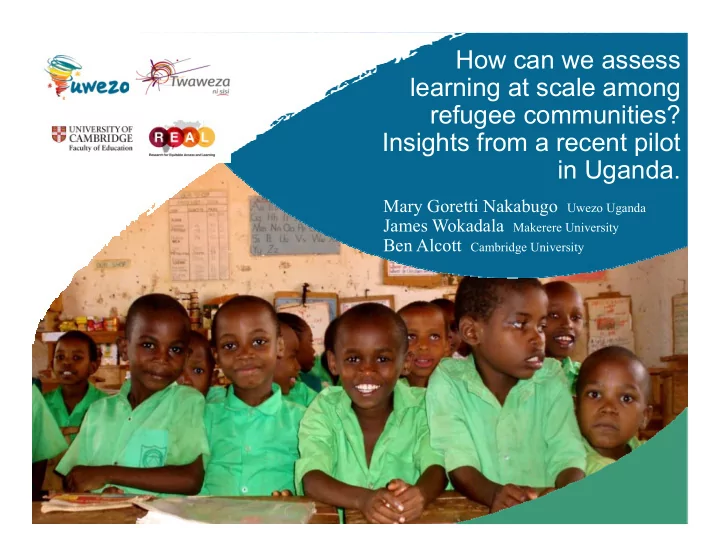

How can we assess learning at scale among refugee communities? Insights from a recent pilot in Uganda. Mary Goretti Nakabugo Uwezo Uganda James Wokadala Makerere University Ben Alcott Cambridge University
Presentation outline 1. Goals of the pilot 2. Achievements & challenges 3. Lessons/adaptions for future surveys
1. Goals of the pilot • Assess basic learning levels for children aged 6–16
1. Goals of the pilot • Assess basic learning levels for children aged 6–16 – Compare conditions in refugee settlements to host communities
1. Goals of the pilot • Assess basic learning levels % in grade 5 who are learning basics for children aged 6–16 47 – Compare conditions in refugee 42 41 38 settlements to host communities 32 30 27 20 Arua Yumbe Adjumani Isingiro Refugee Non refugee
1. Goals of the pilot • Assess basic learning levels Meals per day for children aged 6–16 – Compare conditions in refugee settlements to host communities 34 53 13 Non refugee – Survey home environment 7 66 28 Refugee 3 meals 2 meals 1 meal
1. Goals of the pilot Refugee settlement Host community • Assess basic learning levels 111 for children aged 6–16 Pupils per textbook (P2) – Compare conditions in refugee settlements to host communities – Survey home environment – Survey school environment 27 3 4 Adjumani Yumbe
1. Goals of the pilot • Assess basic learning levels for children aged 6–16 ≈ 5,000 Children – Compare conditions in refugee settlements to host communities 2,400 Households – Survey home environment 120 Schools – Survey school environment • Do this at scale
1. Goals of the pilot • Assess basic learning levels for children aged 6–16 – Compare conditions in refugee settlements to host communities – Survey home environment – Survey school environment • Do this at scale • Do this with citizens, including refugees
Presentation outline 1. Goals of the pilot 2. Achievements & challenges
2. Achievements & challenges Enumeration Schools by Households by areas by refugee refugee status refugee status status Target = 15 Target = 300 Target = 15 89% 100% 100% Adjumani Refugee 93% 100% 100% Non-Refugee 90% 100% 100% Refugee Arua 93% 100% 100% Non-Refugee 88% 100% 100% Isingiro Refugee 92% 100% 100% Non-Refugee 91% 100% 100% Yumbe Refugee 93% 100% 100% Non-Refugee 91% 100% 100% Total
2. Achievements & challenges 3 key ingredients for a survey: Sampling Instruments Assessors frame • Ease of access • Uwezo’s • Feasible to national tools recruit refugees But… • No sampling worked But… frame exists for • Not too time- • Validating refugee consuming qualifications settlements
Presentation outline 1. Goals of the pilot 2. Achievements & challenges 3. Lessons/adaptions for future surveys
3. Lessons for future surveys 3 key ingredients for a survey: Sampling Instruments Assessors frame • Flexibility re • Consultation • Important items: with UBoS • Nationality validation of and broader • Duration qualifications • Use host and coverage • Child-headed households refugee trainers • Refugee aptitude
Contact Us! Uwezo Uganda at Twaweza, Naguru Go down, Suwara Road, Plot 77 P.O Box 40163, Kampala‐Uganda Tel: +256‐312112815 Email: uwezo.uganda@twaweza.org twaweza.org / www.uwezo.net
Recommend
More recommend